VW 2023 models no longer come with chargers, and dealers can offer a portable VW-branded EVSE 120v/240v (full analogue of Webasto Go) with a maximum Level-2 power of 7.7kW.
It turns out that the charger with the VW logo has a NEMA 14-50 connector that allows other chargers to have a higher power of 9.6kW as opposed to 7.7kW. In this review, we’ve looked at the top-rated models of VW chargers and highlighted the models we’ve tested.
Most home EVs have a 1.6–7.7kW charging rate, which means it would take about 8–30 hours to fully charge from zero, but there are some with faster speeds such as the 22kW Tesla Destination Charger.
Best 240V hardwired charger
A hard-wired charger can be pricey to install, but it doesn’t require any upkeep. Once installed, you never have to worry about forgetting to unplug your charger—it’s always on and ready for use.
- $60058Prime
eligibleJul 26, 2024 11:15 PM
Plus, because the charging station is hardwired into your electrical system (upgrading not required), you can charge with a higher wattage Level 2 charger (up to 12 kW).
Best 240V portable charger
- #1 VW compatibleLectron Level 2 Portable EV Charger (240 Volt, 21ft Cable, 32 Amp) NEMA 14-50 Plug, J1772$23699Prime
eligible7-10 days deliveryJul 26, 2024 11:15 PM - $21999Prime
eligibleJul 26, 2024 11:15 PM
If you want to charge your electric car at home, but don’t really have the resources for a hardwired charger or can’t find an available plug in your garage or driveway, consider getting a charging station. EV Adept customers often choose these models:
The best part is that these stations are comparatively less expensive than installing wiring and they’re easy to unplug when not needed. With this type of system, there’s also no need to worry about overloading your household electrical system because it has built-in circuit breakers.
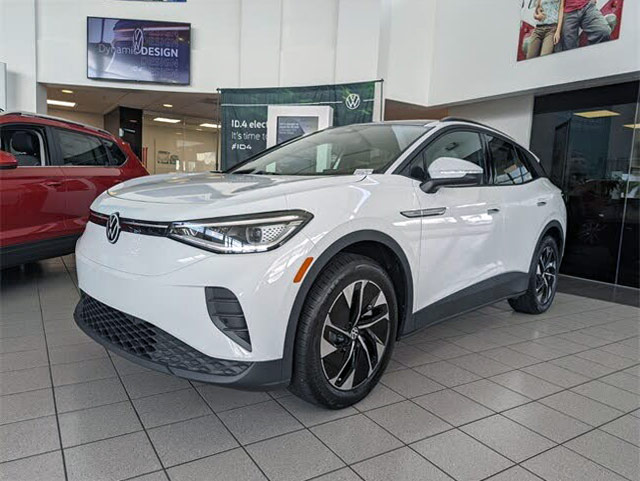
Which Volkswagen ID.4 charger do I need?
The VW ID. 4 comes with an L1 charging cable, but for faster charging times, you have the option to upgrade to an L2 wallbox. With a Level 2 EV charger, you can fully charge the VW ID. 4 in approximately 7.5 hours.
If you are looking for a home сharger for your VW ID.4, we recommend upgrading to a higher-amperage charger like the 40 amp or 48 amp models. This will allow you to charge your vehicle much more quickly and efficiently.
How to choose EV home сhargers for any J1772 car?
Home EV chargers will work with any electric car that carries the J1772 standard. The only exception would be Teslas, which come with their own specific charging equipment built in.
Here are three steps to follow when choosing your home charger:

Step 1: How fast do you need to charge?
The first thing to consider is how much power do you require from a home charger VW ID. 4. This determines the type of connector you can use, and ultimately affects your choices for a given amperage.
Charging your EV at a public station could take anywhere from 1–4 hours depending on where it’s located and what model car it’s used with. Charging from a 240-volt wall plug could take anywhere from 3–8 hours, depending on the car.
Most home EVs come with a 120-volt (Level 1) or 240-volt (Level 2) charger as standard equipment.
Level 1: VW ID. 4 and other 100% electric cars – Standard 120v charging cable comes with your EV, installed by the factory for overnight charging at home using a regular household outlet. This is the slowest way to charge and requires 12 hrs or more to fully recharge your EV’s battery pack from zero capacity.
Level 2: Volkswagen ID. 4, Tesla Model S or any EV with a battery capacity of 5+ kWh – 240v charging cable comes with your EV, installed by the factory for overnight charging at home using a regular household outlet. This is the second slowest way to charge and requires 5 hrs or more to fully recharge your VW ID.4 from zero capacity.
Step 2: Cost and Installation
When it comes to choosing a home charger, cost is often the first thing that comes up. The good news here is that prices on home chargers have dropped significantly as EV popularity has grown. Also, installation costs for a home electric car charger should be around $500 – $1,500 total.
There’s also a difference in installation quality and safety depending on who does your work — we recommend that you do your research and go with a professional electrician for the job whenever possible.
Step 3: Where to install?
The location of your home charger is another very important consideration. Placing it outside will leave you vulnerable to the elements, so this might not be the best choice unless your Volkswagen ID. 4 is protected by some kind of garage or shelter. If it is outside though, make sure you get a weatherproof charger. Ideally, do not use EV extension cords unnecessarily. And if you have to, do it temporarily.
If it is inside, think about where charging can fit into your daily routine and how access might impact other members of your household (such as small children) before installing an electric car charger. You’ll also need to consider the length of the charging cable that comes with your charger.
Step 4: Charging at home vs. public charging
Charging at home is definitely more convenient, but public chargers are becoming more and more common. The advantage of using a public charger is that they can often provide a lot more power than what you might get at home, which can be helpful for topping off your battery quickly. However, most public chargers are not free to use.
Step 5: Charging standard or fast?
Some EVs come with two types of charging options – standard or fast. Standard charging will work just fine for most people, but if you need to charge your car quickly, then fast charging is the way to go. However, fast charging is only an option for certain models of electric car.
Step 6: EV charger size and installation options
EV chargers come in a variety of sizes and setups — everything from portable units that you can take with you on road trips to ones that are permanently installed. Your home’s available space will definitely play a role here, so think about how much room your Volkswagen ID 4 EV charger will need before making a purchase.
Finally, it’s important to mention the level of installation required for any given EV charger. Some can be hardwired into existing power sources while others require wiring by an electrician. If you’re comfortable working with 120-240VAC and 15A maximum, you might be able to save some money by doing the installation yourself.
Step 7: The future of electric cars
As more and more people switch to electric cars, the need for reliable and easy-to-use home chargers will continue to grow. So whether you’re just starting your EV journey or you’re already a seasoned pro, make sure to keep these factors in mind when choosing a home charger for Volkswagen ID. 4.
How do home EV Chargers work?
EV chargers (also known as electric vehicle supply equipment, or EVSEs) create direct current (DC), which is used to store power in the battery pack of an electric car. They’re often located at your home or office and can be traced back to their grid-tied counterpart, the Level 2 charging station. They also can be used to charge your ID. 4, even if you’re not at home.
Where to buy a Level 2 EV charger?
The best place to buy a Level 2 EV charger would be through a certified Volkswagen dealer. They will have chargers that are specifically designed for your ID. 4 and will come with the necessary installation hardware. You can also find many third-party retailers selling chargers online, but be sure to do your research on the quality and compatibility of the product before making your purchase.
How much does it cost to install a home EV Charger?
EV charger installation costs can vary significantly, depending on the type of charger you choose, who does the installation, and any additional wiring that might be required. On average, you can expect to spend anywhere from $500 – $1,500 total. Make an appointment with one of our experts to talk about installation ID. 4 charger.
How long until the Volkswagen id4 electric car is fully charged
| EV Home Charger • 40 Amp | EV Home Charger • 32 Amp | EV Home Charger • 16 Amp | |
|---|---|---|---|
| VW ID.4Pro Performance • 77 kWh | 6 h 01 min | 7 h 30 min | 15 h 12 min |
| VW ID.4Pure Performance • 52 kWh | 5 h 25 min | 5 h 25 min | 10 h 16 min |
| VW ID.4GTX • 77 kWh | 6 h 01 min | 7 h 30 min | 15 h 12 min |
A different amperage of the charging station or a different module of the electric car? The calculator will help you make calculations for them as well.
Comparison table – 240V hardwired charger
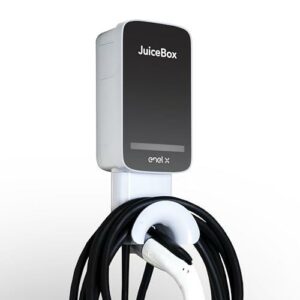 |  | |
| JuiceBox 40 Hardwired Smart EV Home Charging Station (40 Am... | Wallbox Pulsar Plus Level 2 EV Charging station 11.52 kW (2... | |
| Overview | A hardwired connection that is perfect for those who want to be prepared for an EV future with more power. Professional Installation is required. The app and stable wifi make it easy to keep track of your charging. | Voice control-enabled. Designed for intelligent, professional installation to a 70A breaker and provides excellent performance. |
| Brand | JuiceBox | Wallbox |
| Amperage | 40 | 48 |
| Cable length, ft | 25 | 25 |
| Enclosure Material | n/a | |
| Outdoor | Yes | Yes |
| Wall/Stand | Wall | Wall |
| Waterproof | Yes | NEMA Type 4 |
| Weight | 21.2 | 22.8 |
| Working temperature | n/a | n/a |
| Warranty | 3 years | 3 years |
| Certificate | UL & Energy Star | UL |
Comparison table – 240V portable charger
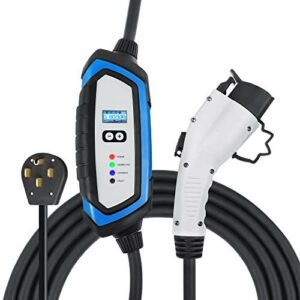 | 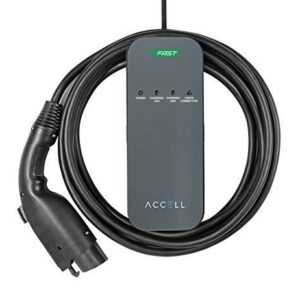 | 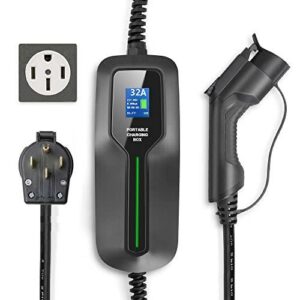 | |
| Lectron Level 2 Portable EV Charger (240 Volt, 21ft Cable, ... | Accell AxFAST Level 1 and 2 Portable EV Charger 3.8 kW (120... | BESENERGY Level 2 Portable EV Charger NEMA 14-50 Plug, 32 A... | |
| Overview | Сompact device. The light weight makes it easy to transport. | ||
| Brand | Lectron | Accell | BESENERGY |
| Amperage | 32 | 16 | 32 |
| Voltage | 240 | 120, 240 | 240 |
| Cable length, ft | 21 | 24 | 21 |
| Level | 2 | 1, 2 | 2 |
| Outdoor | No | Yes | |
| Socket | NEMA 14-50 | NEMA 10-30, NEMA 5-15, NEMA 6-20 | NEMA 14-50 |
| Waterproof | No | IP55 | IP66 |
| Weight | 10.8 | 5.99 | 10.73 |
| Working temperature | -22°F to 122°F | n/a | -13℉ - 131℉ |
| Warranty | 1 year | n/a | 1 year |
| Certificate | Ul certified | n/a |
Electrify America
With the Electrify America Volkswagen ID.4 charging plan, you can recharge your car for free for the first 30 minutes of every session, for as long as you own the vehicle. This plan is available in all 50 states, and includes more than 470 charging stations. In addition, a year-long pass to Electrify America’s Pass+ membership program gives you access to discounted charging rates.
The VW ID.4 charging specs and guide give you an idea of what you can expect from this charging system. It comes with a 120-volt portable charger that delivers 10 amps, 12 amps, and 16-amps of power. These chargers are designed to charge a battery in less than one hour and charge a car at speeds of between two and five miles per hour. Although the Electrify America system includes a Level 2 charger, most Volkswagen ID.4 owners will not need that level of power.
Unlimited
The VW ID.4 is capable of rapid charging and slow charging at EV public charging stations. The charge rate depends on the charging unit and network, so make sure to check the charging specs and guide before you start recharging. The ID.4 also accepts charging from other public charging points via a tethered CCS connector. Read on for charging specs, guide and more! Also, find out which ports are compatible with your Volkswagen.
For charging your Unlimited Volkswagen ID.4, you should use a charge point that is approved for charging EVs. If your VW has an OLEV-approved charger, you may be eligible for PS300 in grant money. While this grant isn’t available for all vehicles, it is well worth applying for. Once you have your ID.4 installed, you’ll be able to use it at home and save money on gas!
When Can We Expect the 2024 VW ID.4 Release?
There is no official word yet on when the 2024 VW ID.4 will be released. However, new Volkswagen models are typically released in a predictable pattern. For example, the 2021 VW ID.4 made its debut in Q4 of 2020, followed by the 2022 and 2023 models1. Based on this trend, we can expect the 2024 model to be released around the same timeframe.
What Range Can We Expect for the 2024 VW ID.4?
While specifications for the 2024 VW ID.4 are still under wraps, the 2023 model can deliver an EPA-estimated 275 miles of range2. Expect the 2024 model to improve upon this impressive range. Stay tuned for more updates as we get closer to the 2024 VW ID.4 release date.
What’s New About the 2024 VW ID.4’s Infotainment System?
The 2024 VW ID.4 is rumored to feature a brand new 15-inch touchscreen infotainment system that will provide better readability and easier access compared to the outgoing model’s 12-inch system3. Expect the new system to function more smoothly and quickly as well.
Volkswagen is set to introduce new remote features and Plug & Charge capability to the ID.44. The bidirectional charging feature for the 77-kilowatt-hour battery will allow owners to power their home appliances through vehicle-to-home functionality only5.
Are There Any New Configurations for the 2024 VW ID.4?
The 2024 VW ID.4 is expected to be released in a variety of configurations, including some new ones. One of these new configurations may include an 86 kWh battery pack, providing a higher range than the outgoing model’s 77 kWh unit6. This could potentially offer a range of around 300 miles (U.S. EPA) / 350 miles (Germany WLTP) 7.
What is the Best Home Charging Option for Volkswagen ID.4 Owners?
Adding a Level 2 charger at home is the most practical option for most Volkswagen ID.4 owners8. These chargers typically require a 240-volt plug, which is the same as those used for large home appliances, or can be hard-wired into the home circuits for optimal convenience9.
What Types of Charging Are Available for the VW ID.4?
Depending on the charging station network and type of charge unit, the VW ID.4 can be charged slowly, quickly, or rapidly10. Slow charging usually requires a 3-pin-to-Type 2 cable, while fast charging requires a Type 2-to-Type 2 cable, and one of these cables usually comes with the vehicle.
Should You Charge Your VW ID.4 EV to 100% Capacity Every Night?
Charging your EV to 100% battery capacity every night is not advisable since charging cycles can cause battery degradation11. Most VW ID.4 EVs have a range of a few hundred miles on a single full charge, which should be sufficient for a few days unless you are driving long distances daily12.
Why Shouldn’t You Charge Your VW ID.4 EV to 100% Capacity?
There are two reasons why it is not recommended to charge an VW ID.4 EV to 100% capacity: charging performance and battery longevity. Charging rates slow down significantly past the 80% mark, so it is best to charge your EV up to 80% most of the time13. Furthermore, keeping the battery pack below 100% capacity will improve the long-term health of your vehicle’s battery14.
Is Charging Your VW ID.4 with a 3-Pin Plug Practical?
While it is possible to charge an electric car using a conventional 3-pin plug with an EVSE1 cable (also known as a granny cable) and domestic socket, this method can be painfully slow15. A domestic 2.4kW socket can take over 24 hours to fully charge your VW ID.4 EV battery, which may not be practical for most drivers.
Should You Charge Your VW ID.4 Electric Car Every Night?
In most cases, charging your ID.4 electric car every night is unnecessary and can shorten the lifespan of the car’s battery pack16. Instead, focus on maintaining a sufficient charge to meet your daily driving needs while preserving the health of your battery.
What is the Maximum Charging Power for the ID.4 Pure and Pure Performance?
At an AC charging station, the ID.4 Pure and Pure Performance can charge at a maximum power of 7.2 kW, taking about 4 hours and 30 minutes to charge from 0 to 100 percent17.
What Vehicle-to-Home (V2H) Update is Coming to the ID.4?
The ID.4 update will arrive in the form of Vehicle-to-Home (V2H), allowing owners to power their appliances from the car or the entire house in case of a blackout18. This innovative feature adds versatility to your electric vehicle and can be a valuable asset during power outages.
How Long Does It Take to Recharge the 2023 ID.4 EV with a Level 2 Charger?
Recharging the 2023 ID.4 EV completely with a Level 2 charger should take about 7.5 to 11.5 hours, with a charging rate of around 24 to 36 miles of range per hour. This charging speed offers a more practical and efficient option for Volkswagen ID.4 owners.
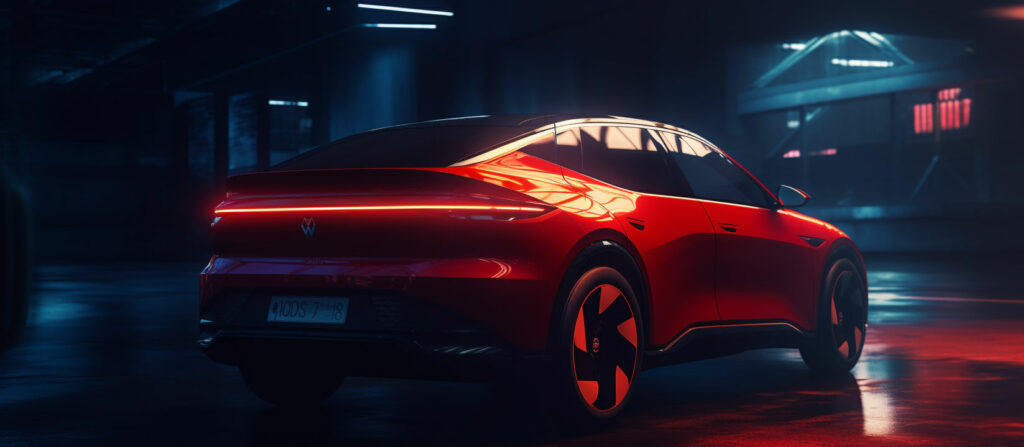
How to Maximize Your Volkswagen ID.4 Charging Experience
By understanding the various charging options and their limitations, you can optimize your Volkswagen ID.4 charging experience. Avoid using slow 3-pin plug chargers as a regular solution, and instead invest in a Level 2 charger for faster, more efficient charging. Keep in mind that charging your electric car every night might not be necessary and could impact your battery’s lifespan.
Can You Charge Your ID.4 Electric Vehicle with a Regular Outlet?
Yes, you can simply plug your VW ID.4 into a regular outlet, which should give you about 2 miles of range per hour spent on the charger19. However, this method is much slower than using dedicated EV charging solutions.
Can You Charge Your VW ID Vehicle Using Tesla Chargers?
While the Tesla Supercharger network is not yet open to Volkswagen ID vehicles, you can still charge your VW ID vehicle using Tesla destination chargers and home charging solutions in the meantime20. This will require a special adapter.
What Do You Need to Charge Your 2023 ID.4 EV at Home?
To charge your Model Year 2023 ID.4 EV at home, you will need to buy a wallbox charger or charging cable because it does not come with a Level 1 or Level 2 charging cable21.
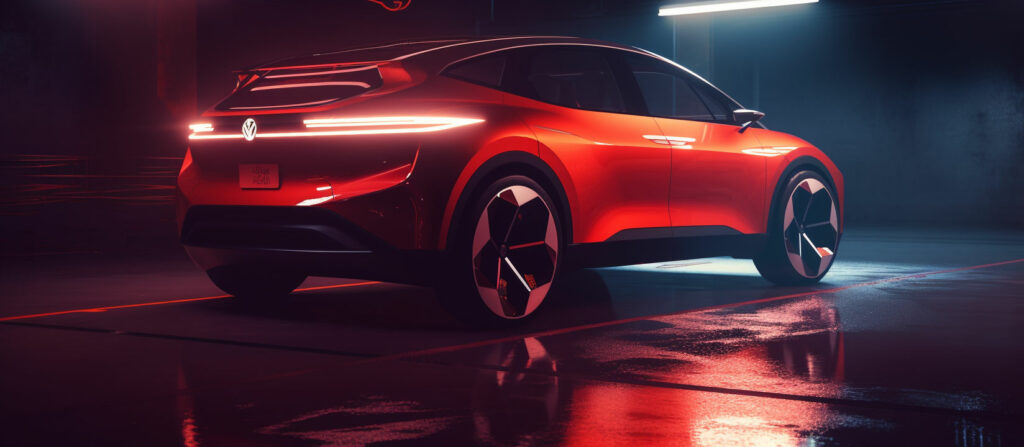
How Can You Maintain Your ID.4’s Battery Health in the Long Run?
To keep the battery of your ID.4 or any electric car in good health in the long run, it is advisable not to charge it to 100% or let it go below 10%22. Maintaining it in the range of 80% to 20% will provide you with the most extended battery life.
What Connectors Can You Use to Charge Your Volkswagen ID.4?
You can charge your Volkswagen ID.4 at home, work, or a public charging point using a Type 2 connector. There is also a CCS connector available for rapid charging23.
What Free Charging Offers Come with the 2023 Volkswagen ID.4?
Like the 2022 Volkswagen ID.4, the 2023 model comes with three years of unlimited, free 30-minute fast charging sessions at Electrify America locations throughout the United States, with a 60-minute waiting period between charging sessions.
FAQ
What is the best EV home charger for VW ID.4?
The best electric сar home charger for VW ID.4 is a Level-2 charger, which can be installed by a professional or by you if you buy a powerful enough device with a simple and easy plug-in connection for an outlet. Mike Becker compared the top models in this review.
Can VW ID.4 use a Tesla charger?
In the U.S. and Canada, you can charge from a Tesla Wall Connector or Tesla Destination at home using the NACS-to-J1772 adapter. There is only a prototype fast-charging adapter for Level-3.
How long is the VW ID.4 charging cable?
The length of the charging cable for VW ID.4 is 20ft when considering portable EVSEs with the VW logo. The analogs for comparison are 25 feet. See the comparison table for an overview.
How much does VW ID.4 charging cost?
VW ID.4 charging will depend on the electricity prices in your area and the type of charger used. Generally, Level-2 chargers are not more expensive than Level-1 chargers, but they also provide faster charging times. On average, it costs about $0.15 per kWh to charge a Volkswagen EV. Make your calculation using this calculator.
How many amps does the Volkswagen ID.4 charger have?
The maximum amp output for VW ID.4 is 30A. Starting in 2023, there is no charger included with the car. So this is not the most powerful home charger compatible with VW EVs presented in this comparison review.
What charger does Volkswagen ID.4 ID.4 come with?
Starting in 2023, the chargers will not come with the cars. You can buy a charger from your dealer, but it’s not the most powerful, and we show you the top compatible devices in this real-world comparison.
How much is a VW ID.4 charger?
The cost of an original Volkswagen ID.4 electric vehicle charger will vary depending on where you buy it, but they typically range from $400–$550. This charger has no smart features and is limited in power. That’s why most VW owners consider top-rated analogs, which we compare in the review.
How fast does VW ID.4 charge?
The charging speed of VW ID.4 will depend on the type of EVSE used and the power output of your local charging station. The home EV charger with the VW logo takes 8 hours to charge to 80%, and the more powerful chargers in this review take 6 hours.
How far can VW ID.4 go on one charge?
The range of VW ID.4 depends on several factors such as terrain, weather conditions, driving style, and battery size, but overall it is estimated that it may be able to travel around 250 miles (400 km) on a full charge. This range may be affected by the age and condition of the battery, so it is important to monitor its performance regularly. Calculate your own range here.
Does VW ID.4 have fast charging?
Yes, VW ID.4 has fast charging capabilities with up to 125 kW of power available when connected to a Level-3 charger. This enables you to reach full charge in just over an hour depending on your vehicle’s battery size and current state of charge.
How much does it cost to install a Level-2 electric car charger for VW ID.4?
The cost of installing a Level-2 charger for VW ID.4 will depend on the type of charger and installation site, but generally it is best to have it installed by a professional electrician. The cost will vary depending on the complexity of the setup, but typically it can range from $450–$1100.
Does installing an electric car charger void my warranty?
No, installing an electric car charger in your home or office space should not void your VW ID.4 warranty as long as you use an approved and certified charger. Here you can see a comparison of certified EV compatible charging stations.
What type of plug does VW ID.4 use?
In North America VW ID.4 uses a CCS1 plug for DCFC charging and a J1772 plug for Level-2 or Level-1 charging. How much does a powerful home charger for VW cost? See what the experts say here.
Where can I find charging stations near me?
For VW ID.4 you need a J1772 or CCS1 plug. You can find compatible public charging stations near you by using maps on websites such as Plugshare or by using apps like ChargePoint or EVgo. You can also use Tesla Destination chargers if you buy an adapter.
Contents
- 1 Best 240V hardwired charger
- 2 Best 240V portable charger
- 3 Which Volkswagen ID.4 charger do I need?
- 4 How to choose EV home сhargers for any J1772 car?
- 5 Step 1: How fast do you need to charge?
- 6 Step 2: Cost and Installation
- 7 Step 3: Where to install?
- 8 Step 4: Charging at home vs. public charging
- 9 Step 5: Charging standard or fast?
- 10 Step 6: EV charger size and installation options
- 11 Step 7: The future of electric cars
- 12 How do home EV Chargers work?
- 13 Where to buy a Level 2 EV charger?
- 14 How much does it cost to install a home EV Charger?
- 15 How long until the Volkswagen id4 electric car is fully charged
- 16 Comparison table – 240V hardwired charger
- 17 Comparison table – 240V portable charger
- 18 Electrify America
- 19 Unlimited
- 20 When Can We Expect the 2024 VW ID.4 Release?
- 21 What Range Can We Expect for the 2024 VW ID.4?
- 22 What’s New About the 2024 VW ID.4’s Infotainment System?
- 23 Are There Any New Configurations for the 2024 VW ID.4?
- 24 What is the Best Home Charging Option for Volkswagen ID.4 Owners?
- 25 What Types of Charging Are Available for the VW ID.4?
- 26 Should You Charge Your VW ID.4 EV to 100% Capacity Every Night?
- 27 Why Shouldn’t You Charge Your VW ID.4 EV to 100% Capacity?
- 28 Is Charging Your VW ID.4 with a 3-Pin Plug Practical?
- 29 Should You Charge Your VW ID.4 Electric Car Every Night?
- 30 What is the Maximum Charging Power for the ID.4 Pure and Pure Performance?
- 31 What Vehicle-to-Home (V2H) Update is Coming to the ID.4?
- 32 How Long Does It Take to Recharge the 2023 ID.4 EV with a Level 2 Charger?
- 33 How to Maximize Your Volkswagen ID.4 Charging Experience
- 34 Can You Charge Your ID.4 Electric Vehicle with a Regular Outlet?
- 35 Can You Charge Your VW ID Vehicle Using Tesla Chargers?
- 36 What Do You Need to Charge Your 2023 ID.4 EV at Home?
- 37 How Can You Maintain Your ID.4’s Battery Health in the Long Run?
- 38 What Connectors Can You Use to Charge Your Volkswagen ID.4?
- 39 What Free Charging Offers Come with the 2023 Volkswagen ID.4?
- 40 FAQ
Reference
- https://www.caranddriver.com/news/a34284424/volkswagen-id-4-electric-suv-revealed/
- https://www.motortrend.com/news/volkswagen-id-4-range-mpge-ev/
- https://insideevs.com/news/512272/volkswagen-id4-2023-interior-update/
- https://www.greencarreports.com/news/1132896_vw-id-4-remote-features-plug-charge
- https://www.autocar.co.uk/car-news/new-cars/volkswagen-launch-bidirectional-charging-id-family-2022
- https://www.carbuzz.com/news/2021/8/15/volkswagen-id4-gets-another-range-boost-for-2022
- https://www.greencarreports.com/news/1132961_vw-id-4-range-boosted-to-267-miles-for-2022
- https://www.vw.com/electric-concepts/charging/
- https://www.energy.gov/eere/electricvehicles/electric-vehicle-charging-home
- https://www.volkswagen.co.uk/electric/electric-driving/charging
- https://www.wired.com/story/how-to-charge-an-electric-car/
- https://www.fueleconomy.gov/feg/evtech.shtml
- https://www.cnbc.com/2021/04/23/electric-vehicle-charging-101.html
- https://batteryuniversity.com/learn/article/how_to_prolong_lithium_based_batteries
- https://www.zap-map.com/charge-points/vw-id-4-charging-guide/
- https://www.fueleconomy.gov/feg/evtech.shtml
- https://www.volkswagen-newsroom.com/en/press-releases/volkswagen-presents-id-4-gtx-6726
- https://www.autocar.co.uk/car-news/new-cars/volkswagen-launch-bidirectional-charging-id-family-2022
- https://www.fueleconomy.gov/feg/evtech.shtml
- https://www.vw.com/electric-concepts/
- https://www.zap-map.com/charge-points/vw-id-4-charging-guide/
- https://www.fueleconomy.gov/feg/evtech.shtml
- https://www.energy.gov/eere/electricvehicles/charging-your-electric-vehicle

Has anyone had experience charging at home in snowy climates?
Can heavy snow and rain cause problems with the charging port if the ID.4 is left on overnight outside?
The charging speed can be affected by low temperatures.
I charged all night when the temperature dropped below 30 during the snowfall, and all is well. My understanding is that the plug and cable are fully insulated.
Does anyone know how to get the VW id.4 to warm up the cabin not from the battery but from the charger?
The car can preheat with the battery, but the ID.4 will also replenish the battery through the charger with what has been lost during preheating in order to maintain an 80% SOC.
Every time you charge an electric car, does that count as a charging cycle?
Can anyone confirm this and can the number of charging cycles degrade the quality of the batteries?
If you count from 0 to 100 in one full charging cycle, then five sessions of 20% is the equivalent of one full 100% cycle.
How fast will the VW ID4 charge with a standard cable?
If I drive ~70 miles a day.
With that kind of mileage, it’s easy to charge your car from any 240V EV home charger in a couple of hours.
The charging port door of the VW ID4 does not open.
I found that the charging port door locks when the electric car is locked. Opening the car opened the charging port door.
It is exactly what you expect, a strong cord well made
Is there any way to schedule less than 50% charging for ID.4 when charging at home on a schedule?
It won’t work because of a broken built-in scheduler. Hopefully this will be fixed soon with a software update.
Will the battery be damaged if you charge it 3 times in a row to 100%, can you do that?
The VW id.4 EV charger speed will decrease, approaching the maximum, as the car does its best to take care of the battery, so you don’t have to worry.
How do I terminate a charging session early for a VW id.4?
You can unplug the vehicle or press the “Stop” button on the screen.
I’m not going to use the car for a few days, is it right to recharge it from time to time with the L1 charger?
Slow charging is always better for the health of an electric car battery.
When I connect the charger to the ID4, there is an air sound coming from the front of the electric car, as if the air conditioner is on. What does this mean?
If the garage is warm, the system that cools the battery works.
The battery management system will work when connected to the mains in most cases, regardless of whether there is active charging going on.
I charge my ID.4 to 80% as recommended. It used to allow him to go about 200 miles. The ID.4 now only shows 180 miles.
With all electric cars, it shows the approximate distance, which can vary from your driving style as well as from the temperature.
Kept the ID.4 on charge and the A/C is still running in the front even when I locked up the electric car. Is this normal?
The battery management system will manage the battery temperature by heating and cooling as needed. So that’s fine.
Is it dangerous to leave the electric car on while charging?
It’s not dangerous, don’t worry.
Can I use the ID.4 to power my home during a power outage?
No. It is better to use a portable generator.
Is there any danger to the Volkswagen ID.4 battery at 95+F degrees?
The battery of the electric car has active temperature control, so it will be fine.
My electric car started with 217 miles, drove 2 miles, and arrived with 209 miles. What does this have to do with it?
The range will decrease along with the temperature. It could be lower outside temperatures.
I charged my ID4 200 miles/80% respectively 230 miles/100%. And other owners have from 250 to over 300 miles. What does this have to do with?
It all depends on weather temperature and other factors. Also, the number of miles you see is approximate.
At night I plugged the electric car into the charger. I assumed that this would be enough to get from 30% to 80%, in the end it turned out only 65%.
According to my calculations, it should have been right, but why is it so?
I had the same problem, the electric car assumes how long it will take to charge it, but it is wrong. Most likely this will be fixed with the update. A simple calculation of charging time can be provided by an EV charging time calculator.
Great article! I was just looking into getting a home EV charger for my new ID.4. This helped a lot!
Does anyone have experience with different EVSE brands? I’m curious about which one to choose.
I’ve heard solar charging for electric vehicles is becoming popular. Any thoughts on that for the ID.4?
i’ve been thinking about upgrading my garage for EV charging, but i didnt know where to start. thx for the info!
anyone else notice how much faster their ID.4 charges at a public charging station compared to at home?
My cousin has a Tesla and he’s always talking about how great the Supercharger network is. Can’t wait for VW to catch up!
Yo, how do u guys manage charging costs with your ID.4? I feel like my electricity bill’s gonna skyrocket.
I’ve heard that some folks are installing smart EVSEs that integrate with their home automation systems. Sounds cool!
Is it better to buy an ID.4 with the smaller battery or go for the bigger one with the longer range?
I’m curious about the vehicle-to-grid (V2G) tech for the ID.4. I’ve heard it can help save on electricity costs.
what’s the best way to find charging stations near me when I’m out and about with my ID.4?
i love my id.4 but sometimes i forget to plug it in. a wireless charging solution would be so awesome!
My friend got a portable EV charger for emergencies. Is it worth investing in one for my ID.4?
omg i cant believe i used to charge my id.4 with a 3-pin plug. level 2 charging is a game-changer!
I’ve been using a Type 2 connector for my ID.4, but I’ve heard CCS is faster. Should I switch?
any1 else think that the free Electrify America charging sessions are a sweet deal for ID.4 owners?
Does the ID.4 support fast DC charging? I’ve seen it on other EVs, but I’m not sure about this one.
I wsh I’d known about the battery health tips earlier! No more 100% charging for me. Thx!
what are some good EV charging apps to use with the ID.4? I’ve tried a couple, but I’m not sold on any yet.